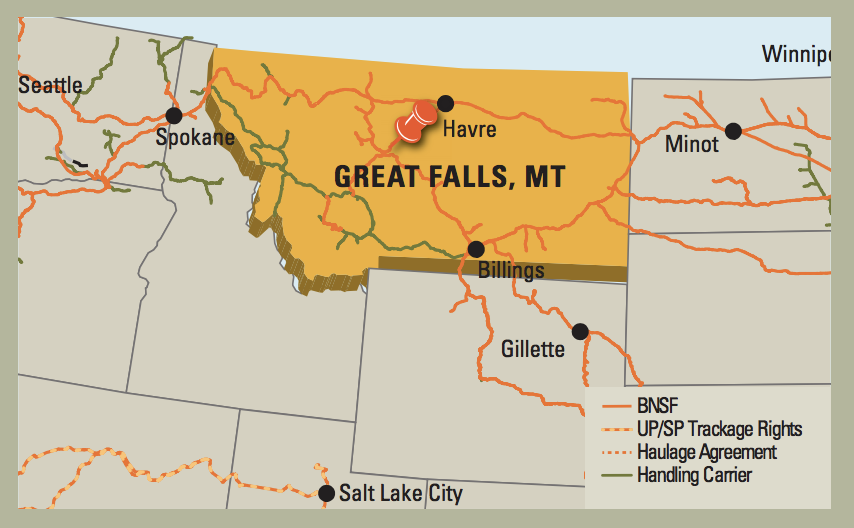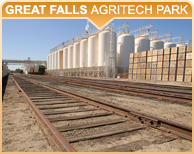
Great Falls, MT — Great Falls is located at one of the most impressive sections of the mighty Missouri. The river drops over 500 feet in elevation as it meanders through the community and its five breathtaking waterfalls — the great falls of the Missouri. Surrounded by productive farmland, Great Falls sits between the Rocky Mountains to its west and Little Belt Mountains to its east. Lewis and Clark explored the area in 1805 and were among the first to experience its logistical challenges when it took them nearly a month to portage around the falls.
Today, Great Falls is a bustling community known for art, quaint parks, riverscapes and city excitement with some mountain solitude. And thanks to an old rail line and new industrial park, logistics is now a big part of economic development in this community.
For decades, community leaders recognized the need for increased rail access. Partnering with a local farmer, they were able to acquire rail-served land next to the city. AgriTech Park has over 1300 acres available with shovel ready lots, Foreign Trade Zone accessibility, completed zoning and BNSF rail service. One of BNSF’s first certified, premier rail parks, it has allowed the city to relocate heavy industry away from the burgeoning commercial and tourist development along the river and attract new employers to the area. Existing and planned tenants include Pacific Steel & Recycling, Montana Specialty Mills, Montana Advanced Biofuels, Helena Chemical and FedEx.
“Creating a shovel-ready, rail-served heavy industrial park had been a goal of ours for years,” says Brett Doney, president of the Great Falls Montana Development Authority. “We see many opportunities, not just in agricultural processing, but in energy-related manufacturing, distribution and logistics.”
Montana Specialty Mills, for example, has invested $20 million into a new 20-acre processing facility expected to be complete in the fall 2018. The facility will add jobs to the company’s existing footprint in town and help it expand into the non-GMO and organic oilseeds markets.

Another example, Montana Advanced Biofuels plans to develop a $400 million wheat and barley ethanol plant. The facility will provide biofuels to West Coast customers. High quality, vital wheat gluten, a by-product of the manufacturing process, will also supply West Coast bakeries. Montana crops include wheat, barley, oil seeds and pulses. Currently, these commodities are moved out of state for value-added processing. AgriTech Park will allow area farmers to sell their crops locally, eliminating transportation cost, while creating additional local jobs.
In addition to several dozen construction jobs, 36 new jobs have already been created at AgriTech Park. Current rail service is provided 5-6 days a week and is expected to increase to daily service. Montana is ranked among the top states in the U.S. for low taxes and production costs.
“The creation of the AgriTech Park has not only allowed us to see existing companies such as MT Specialty Mills retool and reinvest in our community but has also attracted new business enterprises to our community. Both local reinvestment and the attraction of new businesses are critical to moving Cascade County into a brighter future with a more diversified economy. The AgriTech Park is one of our greatest tools in this effort,” says County Commissioner Joe Briggs.


